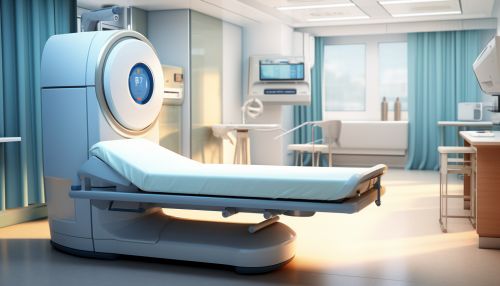Radiobiology
Introduction
Radiobiology, also known as radiation biology, is a field of clinical and basic medical sciences that involves the study of the action of ionizing radiation on living organisms. This discipline is crucial in the application of ionizing radiation in the diagnosis and treatment of diseases, particularly cancer.
History
The study of radiobiology began with the discovery of x-rays by Wilhelm Conrad Roentgen in 1895 and the discovery of radioactivity by Henri Becquerel in 1896. The harmful effects of ionizing radiation were not immediately recognized, despite early signs of radiation-induced skin burns and radiation sickness.


Biological Effects of Ionizing Radiation
Ionizing radiation can have a variety of effects on living cells, tissues, and organisms. These effects can be categorized as either deterministic or stochastic.
Deterministic Effects
Deterministic effects, also known as non-stochastic effects, are those that have a threshold dose below which no effect is observed. Above this threshold, the severity of the effect increases with the dose. Examples of deterministic effects include skin burns, radiation sickness, and acute radiation syndrome.
Stochastic Effects
Stochastic effects are those that occur by chance and which may occur without a threshold level of dose. The probability of the effect rather than its severity is proportional to the dose. Stochastic effects include cancer and genetic effects.
Radiation Protection
Radiation protection, also known as radiological protection, is the science and practice of protecting people and the environment from the harmful effects of ionizing radiation. It involves understanding, evaluating, and controlling the risks associated with radiation in order to protect human health.
Radiation Therapy
Radiation therapy, also known as radiotherapy, is a method of treating cancer and other diseases with ionizing radiation. The radiation used in this treatment can kill or damage cancer cells, preventing them from growing and dividing.


Radiation in Diagnostic Imaging
Ionizing radiation is also used in diagnostic imaging techniques such as computed tomography (CT) scans, positron emission tomography (PET) scans, and x-rays. These imaging techniques allow doctors to see inside the body without invasive surgery.
Radiobiological Research
Radiobiological research is crucial in improving the effectiveness of radiation therapy and reducing its side effects. This research involves studying the biological effects of radiation on cells and tissues, as well as developing new ways to protect healthy tissue from radiation damage.
